
Political parties are an important and inescapable part of democratic societies. They serve as vehicles for citizens to organize and express their political preferences. But, why do they create platforms? What benefits do platforms provide them? These are the questions we will answer in this article. So, let’s dive right in.
Why Do Political Parties Create Platforms?
#1. Communicating Party Ideals
In a democracy, political parties want to win elections. To win elections they need to get citizens to vote for them. One of the ways political parties organize to win elections is to create political platforms. Political platforms are vehicles to effectively communicate their core ideals and values to the electorate. They serve as a detailed blueprint that outlines the party’s principles and its vision for governance. By clearly articulating their beliefs, parties attract voters who share similar values, strengthening their support base.
#2. Policy Formulation
Platforms provide a structured framework for political parties influence policy making. Through platforms they can influence policy issues as varied as healthcare, education, and the economy. Through rigorous debate and negotiation, parties can affect public policy in a way that reflect their overarching principles while addressing the needs of the electorate.
#3. Voter Engagement and Education
Platforms play a vital role in engaging and educating voters. They offer a comprehensive overview of a party’s stance on important issues, enabling voters to make informed decisions. The more a party gets to educate voters the more it stands to influence voters on election day. Additionally, platforms facilitate interaction between parties and voters through town halls, debates, and other communication channels, fostering a more informed electorate.
#4. Mobilization of Support from Members and Supporters
Platforms serve as rallying points for party members and supporters, energizing the party base. By articulating clear goals and agendas, platforms encourage active participation in campaigns and other political activities. And most of all it can help them raise money for their cause. This mobilization and funding is what results in success on election day.
#5. Differentiation from Opponents
Platforms help political parties distinguish themselves from their opponents. By highlighting unique policy proposals and governance approaches, parties set themselves apart in a crowded political landscape. This differentiation is essential for attracting undecided voters and establishing a distinct party identity.
#6. Strategic Positioning in the Political Landscape
Platforms are instrumental for political parties to strategically position themselves within the political landscape. By articulating their stance on key issues, parties can appeal to specific voter demographics and align with prevailing public sentiments. This strategic positioning enables parties to carve out a distinct niche and compete effectively against their rivals.
#7. Hold Elected Officials Accountable
Platforms serve as a benchmark for holding elected officials accountable to their party’s promises and commitments. By outlining specific policy goals and objectives, platforms provide a yardstick against which the performance of elected representatives can be measured. This accountability mechanism ensures that elected officials remain aligned with their party’s agenda and the expectations of their constituents.
#8. Facilitate Internal Party Cohesion
Platforms play a vital role in fostering internal cohesion within political parties. By providing a unified set of principles and policy positions, platforms help minimize ideological divisions and internal conflicts. This cohesion is essential for maintaining party unity and effectiveness in advancing its agenda both during election campaigns and in governing.
#9. Attract Potential Candidates, Donors, and Volunteers
Platforms serve as a recruitment tool for political parties, attracting potential candidates, donors, and volunteers. A well-defined platform that resonates with individuals’ values and priorities can inspire them to become actively involved in the party’s activities. This influx of talent and resources strengthens the party’s infrastructure and enhances its capacity to compete in elections.
#10. Articulate Long-Term Vision
Platforms enable political parties to articulate a long-term vision for the country’s future. By outlining comprehensive policy proposals and goals, parties demonstrate their commitment to addressing pressing societal challenges and shaping the trajectory of governance. This long-term vision provides voters with a clear understanding of the party’s aspirations and its potential impact on the nation’s development.
Closing Thoughts
In conclusion, the creation of platforms is a fundamental aspect of political party dynamics. These platforms serve multifaceted purposes, from communicating party ideals to mobilizing support and holding elected officials accountable. By understanding the significance of platforms, we gain insight into the inner workings of political parties and their role in shaping democratic processes. Moving forward, the evolution of platforms will continue to influence the political landscape, reflecting changing societal values and priorities. As citizens, being informed about party platforms empowers us to make educated decisions and actively participate in the democratic process.
